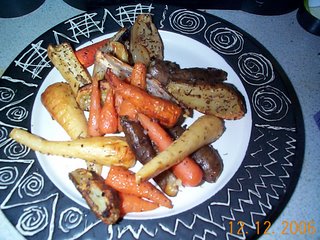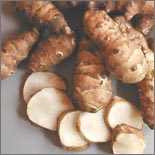
Winter Roasted Vegetables
300g Jerusalem artichokes
300g parsnips
300g baby Chantenay carrots
2 eschalion shallots
6 cloves garlic (or to taste)
spray olive oil
salt, pepper, mixed herbs
This is a bit on an homage to winter veggies - I love the sweet & earthy flavours of Jerusalem artichokes and parsnips!
Could not be simpler to prepare - cut wash and pare vegetables and cut into similar sizes. Steam the Jerusalem artichokes, parsnips and carrots for 5 minutes to partially cook. Add the shallots, halved and the garlic cloves. Spray with olive oil, season with salt, pepper and herbs and toss well to coat. I used some more of the Lakeland "Good with Everything" herb mix.
Roast in a hot oven for about 35-40 minutes or until everything is cooked and browning on the edges.
This makes 2 servings.
Nutrition Data per serving
Calories (kcal) 329.7
Carbohydrate (g) 59.3
Protein (g) 9.3
Fat (g) 7.2
Fibre (g) 15.0
According to the Wikipedia:
"The Jerusalem artichoke (Helianthus tuberosus L.), also called the sunroot or sunchoke or topinambur, is a flowering plant native to North America grown throughout the temperate world for its tuber, which is used as a root vegetable.
Despite its name, the Jerusalem artichoke has no relation to Jerusalem, and little to do with artichokes. The name Jerusalem is due to folk etymology; when the Jerusalem artichoke was first discovered by Europeans it was called Girasole, the Italian word for sunflower. The Jerusalem artichoke is a type of sunflower, in the same genus as the garden sunflower Helianthus annuus. Over time the name Girasole transformed into Jerusalem, and to avoid confusion people have recently started to refer to it as sunchoke or sunroot, which is closer to the original Native American name for the plant.
The artichoke part of the Jerusalem artichoke's name comes from its taste of its edible tuber, which is a cross between a radish and an artichoke.
The tubers are gnarly and uneven, vaguely resembling ginger root, with a crisp texture when raw. Unlike most tubers, but in common with other members of the Asteraceae (including the artichoke), the tubers store the carbohydrate inulin (not to be confused with insulin) instead of starch. For this reason, Jerusalem artichoke tubers are an important source of fructose for industry. The carbohydrates gives the tubers a tendency to break down and dissolve when cooked, in addition to giving them a legendary facility to produce flatulence.
Jerusalem artichokes are sold in the produce departments of many supermarkets. The freshest roots are plumpish and vibrant in appearance. If they are left too long in the open, they become wrinkled and soft and can develop a bitter taste."
Never noticed that I was especially parpy after eating them!




No comments:
Post a Comment